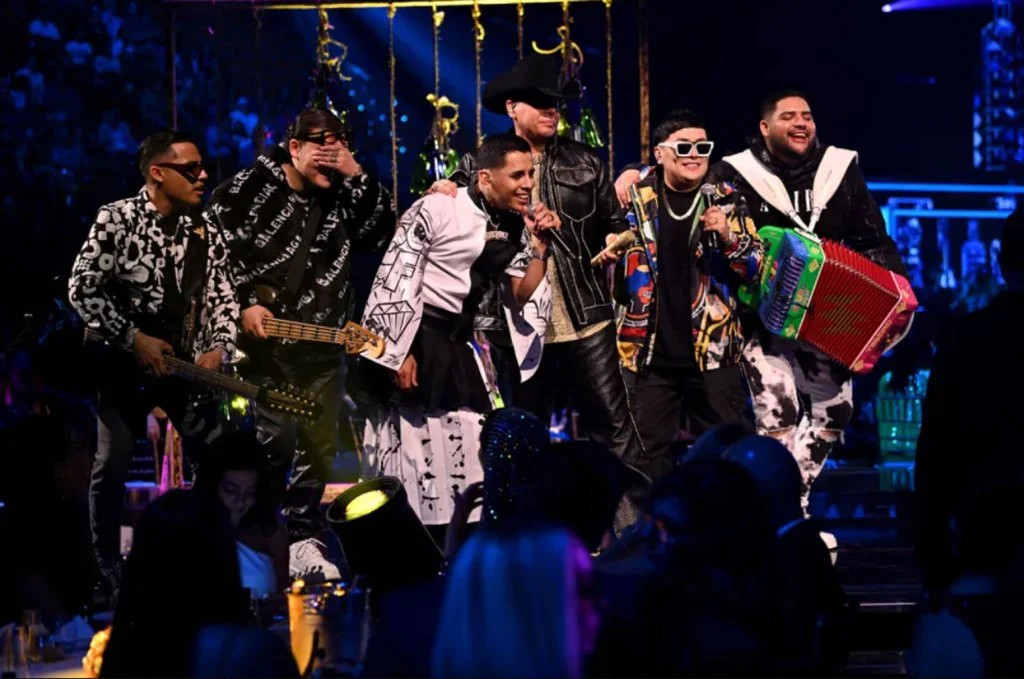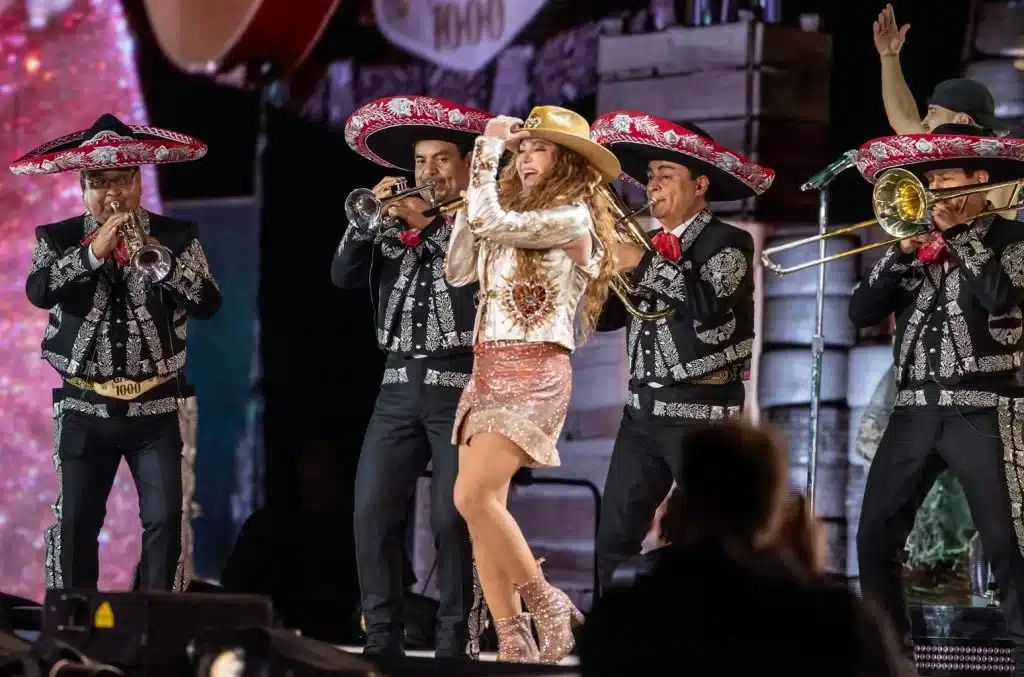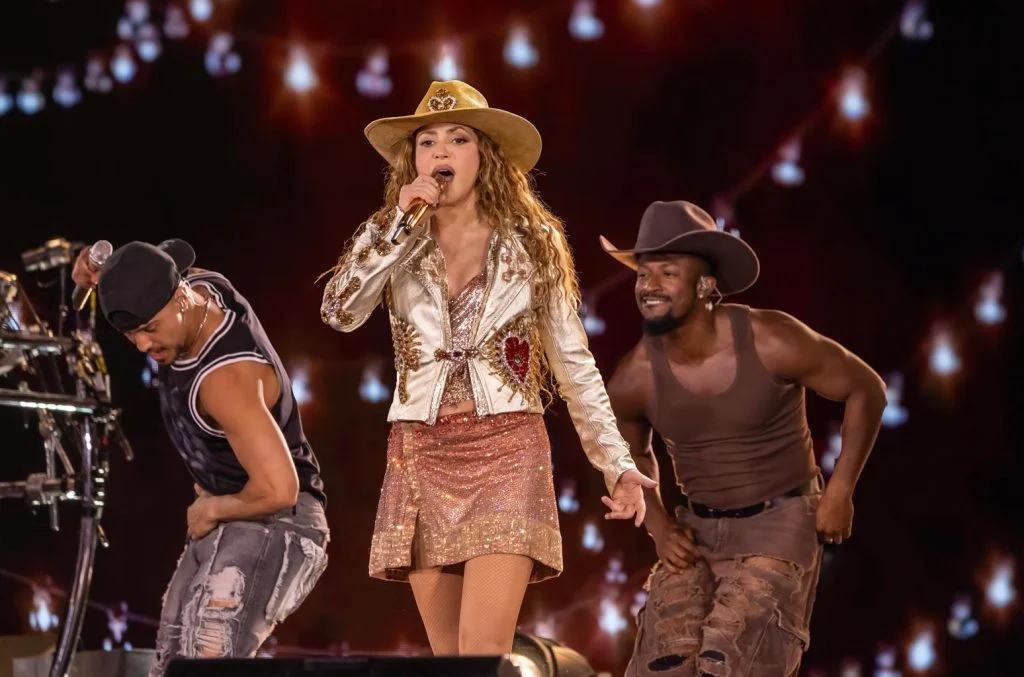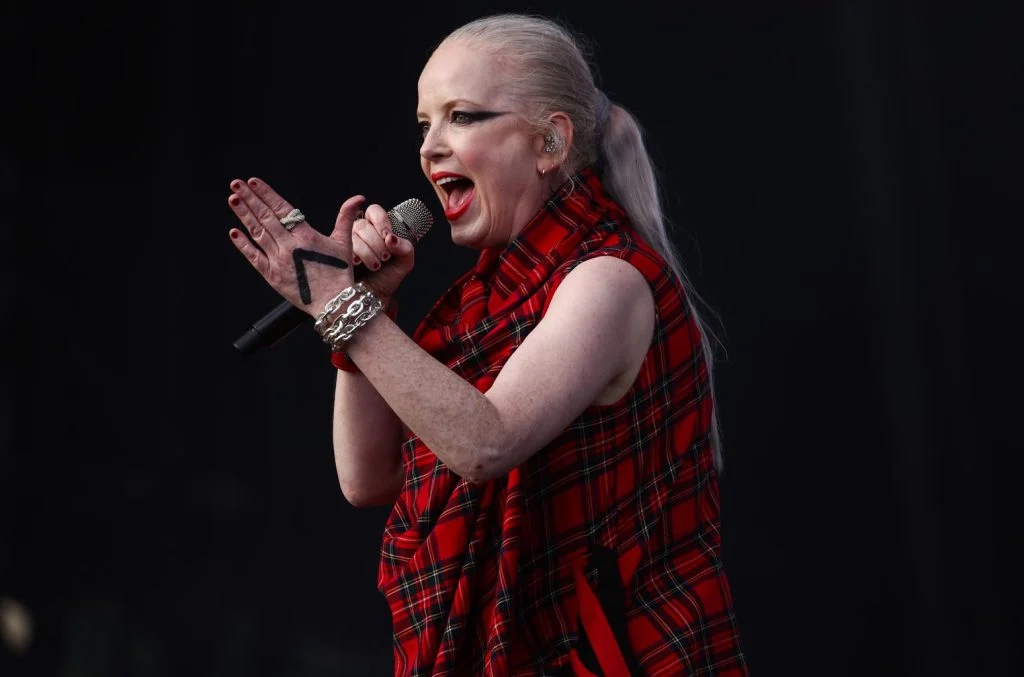MEXICO
Page: 4
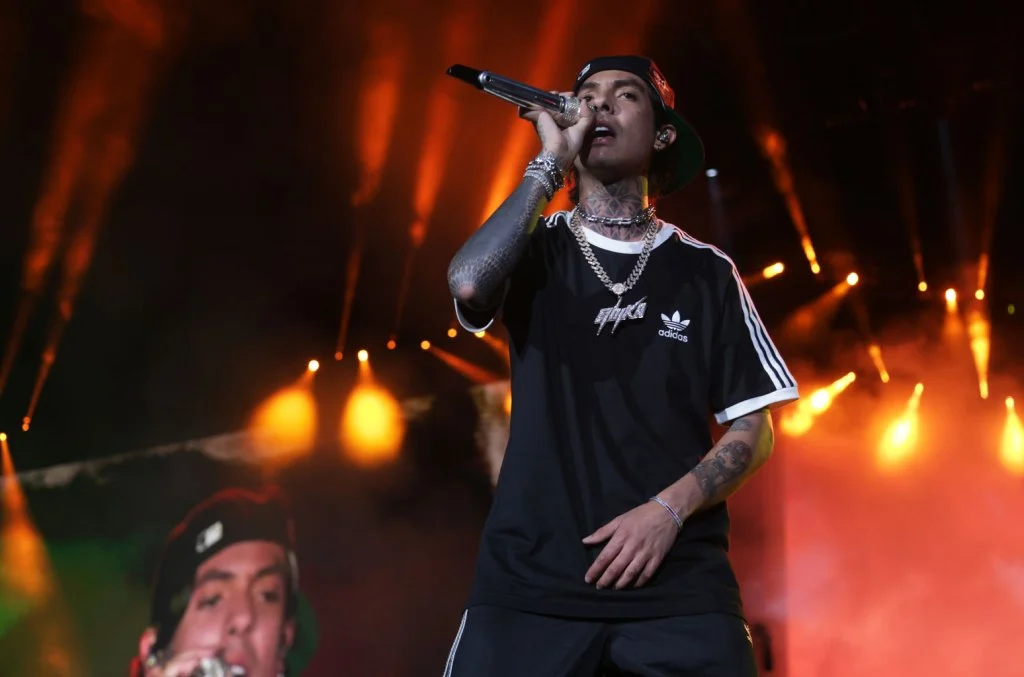
Some call it “the festival of the future” due to its eclecticism and bold approach to creating lineups aimed at a multigenerational audience. For others, AXE Ceremonia brings together major alternative music shows in inclusive spaces, where the distinction from other festivals is evident — from the outfits attendees choose for the occasion to the sonic acts showcased during the marathon event.
But for Diego Jiménez, director and co-founder of the festival, it’s the place that provides the opportunity to host the creator of the popular corridos tumbados genre, Natanael Cano, as a headliner one night — and the next day, the two-time Grammy-winning American rapper Tyler, Tyler The Creator. Amidst all that, attendees can hear trip-hop veterans Massive Attack, British sensation Charli XCX, South Korean boy band Tomorrow X Together, and Argentine experimental trap duo Ca7riel y Paco Amoroso.
“We like to differentiate ourselves from other festivals by focusing on youth culture rather than a specific genre or musical style,” Jiménez tells Billboard Español about the festival, whose 12th edition will take place this Saturday and Sunday (April 5 and 6) at Parque Bicentenario in Mexico City.
Trending on Billboard
“Seeing Tyler, The Creator on a lineup at major festivals around the world is more common, but seeing him one day and Natanael Cano the next doesn’t happen often elsewhere. That gives AXE Ceremonia a very strong personality,” adds the organizer.
Produced by the company ECO Live, this year’s festival lineup is rounded out by a diverse group of international bands and solo artists — including Parcels, Gesaffelstein, Nathy Peluso, The Marías, Meme del Real, pablopablo, Lil Yachty, Artemas, Hanumankind, A.G. Cook, NSQK, The Dare, Simpson Ahuevo, Brutalism 300, and Luisa Almaguer — making it one of the most innovative offerings of the spring festival season.
The 12th edition of the festival will mark the return of Natanael Cano to Mexico City, who previously performed as an emerging artist in 2022. This time, he will take center stage as a headliner after becoming one of the stars of Mexican regional music and delivering a sold-out concert at the Estadio GNP Seguros in August 2024.
“Watching an artist grow like that is very exciting, and it speaks to this dialogue that exists between this city and the rest of the world — of becoming a cultural capital — and how the vision of culture and music from a Mexican perspective has an international impact,” Jiménez observes.
Additionally, this year the festival introduces K-pop to its musical offerings for the first time by inviting South Korean boy band Tomorrow X Together, allowing it to cater to another segment of the audience —Generation Alpha, or those born in the early 2010s. “We like to seek balance, those connections between the past and the present, to create a snapshot of what’s happening today,” Jiménez notes.
The organizer also highlighted the introduction of a new space dedicated to tropical music, salsa, merengue, bachata, and cumbia in this year’s edition of the festival, which will feature two iconic dance halls from Mexico City: Miki’s and Barba Azul.
“Speaking of the present and the past, if you listen to Bad Bunny’s album (Debí Tirar Más Fotos), it’s based on sounds from the past — that distinctly Latin sound. How does youth interact with these sounds? You create a new space,” he explains.
The festival’s organizers expect to gather 55,000 people per day, totaling 110,000 attendees over the weekend. In past editions, the festival’s stages have hosted prominent figures in music such as Björk, Rosalía, Kendrick Lamar, LCD Soundsystem, Travis Scott, James Blake, Wu-Tang Clan, A$AP Rocky, Aphex Twin, Snoop Dogg, Animal Collective, Underworld, Nicolas Jaar and Fuerza Regida.
Mexican band Los Alegres del Barranco spoke out for the first time on Wednesday (April 2) about the controversial concert where they projected images of the leader of the Cártel Jalisco Nueva Generación (CJNG), Nemesio “El Mencho” Oseguera Cervantes, in an auditorium at the University of Guadalajara last weekend. The incident caused the United States to cancel the work and tourist visas of the group’s members.
In a statement and video posted on their social media, the Sinaloan group offered an apology for the events that occurred on Saturday (March 29) during their performance at the Telmex Auditorium, and stated that, as a group, “it was never our intention to create controversy, much less cause offense.”
The band — who has released some songs with clear references to narcoculture — reaffirms that their music is inspired by telling popular stories within Mexican music. “We will take more rigorous measures on the visual and narrative content of our shows,” he added.
Trending on Billboard
The statement from the corrido group — who perform in a genre that has occasionally made clear references to narco-culture and famous cartel leaders since its origins over a century ago — came a day after U.S. Deputy Secretary of State Christopher Landau confirmed on Tuesday (April 1) in a post on X that the government of that country had canceled the visas of the members of the Mexican group following the projection of images “that glorify drug traffickers.”
“In the Trump Administration, we take our responsibility regarding the access of foreigners to our country very seriously. We are not going to roll out the red carpet for those who glorify criminals and terrorists,” Landau stated in both English and Spanish.
The incident, which has caused great controversy and outrage in Mexico, was condemned on Monday (March 31) by Mexico’s President, Claudia Sheinbaum, and prompted the Jalisco State Prosecutor’s Office to launch an investigation for “advocating crime.” U.S. Secretary of State Marco Rubio announced on February 20 the designation of eight cartels — including the Jalisco New Generation Cartel — and transnational organizations as Foreign Terrorist Organizations (FTO) and Specially Designated Global Terrorists (SDGT).
On Tuesday, the governor of Jalisco, Pablo Lemus, stated in a message on X that his government supports the measures taken by the University of Guadalajara to prevent concerts from glorifying criminal acts, such as what occurred over the weekend at the Telmex Auditorium.
Videos show the moment when attendees at the concert titled “Los Señores del Corrido” (The Lords of Corridos) erupted in jubilation as images of the drug lord were projected, further fueling controversy and outrage in Mexico.
In a statement, the Telmex Auditorium distanced itself from the events, explaining that the venue, “has no involvement in the selection of the repertoire, speeches, or audiovisual material that the artists choose to share with their audience.” However, it acknowledged that the images of the drug lord could be considered as “advocating crime.”
The controversy over the alleged homage to the drug trafficker comes after the debate over the way in which the cartel founded in that western Mexican state allegedly uses clandestine ranches to recruit people to the criminal group through deceitful job offers. As reported by federal authorities and the media, a raid by authorities at Rancho Izaguirre in the municipality of Teuchitlán revealed the spot where acts of torture and murders were allegedly committed, actions denounced in March by the Guerreros Buscadores collective, a civilian corps focused on finding missing and disappeared loved ones.

Legendary regional Mexican group Banda El Recodo is gearing up for the release of their new album, En Vivo Desde Japón (Live from Japan). Recorded last year during their performance at the De Camino a Latinoamérica festival in Tokyo at Odaiba Pier, the album will be rolled out in five weekly installments starting this Thursday (April 3).
Explore
See latest videos, charts and news
See latest videos, charts and news
“We decided to release it this way to offer something different,” says Alfonso “Poncho” Lizárraga, leader of the group that was founded in Mazatlán nearly 87 years ago, in an exclusive interview with Billboard Español. “Each installment will feature a collection of songs grouped under a specific theme.”
The first part, titled Orgullo por México (Pride for Mexico), will include tracks like “Puño de Tierra,” “El Sinaloense/El Corrido de Mazatlán,” and “El Rey/Cielito Lindo/Viva México.” This will be followed by Amor Como Lenguaje Universal (Love as a Universal Language) on April 10, featuring a medley of “Te Presumo/Me Gusta Todo de Ti/La Mejor de Todas,” “Y Llegaste Tú,” and the spotlight track “No Me Aprovechaste,” an unreleased song written by Luciano Luna.
On April 17, the third installment, Separación, Distancia, Desamor (Separation, Distance, Heartbreak), will be released, featuring songs such as “Que te Ruegue Quien te Quiera,” “Yo Sé que te Acordarás/Vas a Llorar por Mí/Acá Entre Nos,” and “Triste Recuerdo/Te Ofrezco un Corazón.” A week later, on April 24, Viva La Fiesta (Long Live the Party) will debut, showcasing the tracks “La Crazy Loca,” “La Culebra,” and “La Quebradora/Vámonos de Fiesta.” Finally, on May 8, En Vivo Desde Japón will be completed with a second unreleased track, “El Malo Soy Yo,” along with “Qué Bonita/El Farol.”
This marks the second time Banda El Recodo has recorded a live album outside of Mexico. Back in 1995, they released Desde París, Francia, La Gira Europa ’95 (En Vivo) (From Paris, France, The Europe Tour ’95 Live). It is also their second time performing in Japan, where they first visited in 2002 to support the Mexican National Soccer Team during the World Cup, playing in five different cities.
“This time, we were part of an event where we were invited to share a piece of our culture with an audience of 5,000 people. It was an incredible experience and a great source of pride,” says Lizárraga. “Nowadays, there’s a growing openness to discovering Mexican music — and we find it very important that mariachi and banda are represented worldwide.”
“It’s important to honor and dignify traditional Mexican music,” Lizárraga continues. “We want the history of Mexican music to be respected and preserved. This doesn’t mean we don’t support new talents or younger generations, but it’s crucial to keep our traditions alive.”
Banda El Recodo will kick off the U.S. leg of their ’90s Banda Tour on May 25 in Newburgh, N.Y., joined by Banda Machos, Banda Los Recoditos, and Banda Maguey. The tour will blend traditional banda hits with technobanda and la quebradita, a music and dance explosion that took the scene by storm during the 1990s.
In Mexico, the tour is called Las Más Perronas (Mexican slang roughly meaning the Baddest) and includes only Banda El Recodo and Banda Machos, with three dates announced: July 11 at the Auditorio Telmex in Guadalajara, August 9 at the Arena Ciudad de Mexico, and Sept. 5 at the Arena Monterrey.
Banda El Recodo
Fonovisa/Universal
Grupo Firme is set to kick off La Última Peda Tour on April 11 in Mexicali, following the cancellation of a performance in Mazatlán after a message on a banner with alleged death threats attributed to a drug cartel appeared in Tijuana. And the trek will proceed with reinforced security.
“People can come with confidence and have a good time,” Eduin Caz, the band’s frontman, said during a press conference Thursday afternoon at Estadio Caliente in Tijuana, where the second show of the tour is scheduled for April 12. “We have strengthened security for this tour in Mexico. The shows of Grupo Firme are meant to be enjoyed, and that’s how it will be.”
After a three-year absence from Mexico, La Última Peda Tour will take Grupo Firme to 23 stadiums across the country, including their eighth performance at Estadio GNP Seguros (formerly Foro Sol) on June 28. The tour will also mark their return to palenques, a more intimate type of show that allows for greater interaction with the audience.
Trending on Billboard
“We need to relive that closeness with people that only these types of venues can provide,” said Jhonny Cazares, the group’s third voice. “Great artists we admire, like Alfredo Olivas and Julión Álvarez, do them. These [venues] are smaller, but they’re no less important. Plus, they’re part of our culture.”
Meanwhile, the state government and the Baja California Prosecutor’s Office are continuing their investigation into the threats against the band. The cancellation of the March 1 concert, which was part of the Mazatlán Carnival, was a result of the discovery of an alleged narcomanta and a human head in a box Feb. 25 in Tijuana — a fact confirmed to Billboard Español by the Baja California State Prosecutor’s Office. So far, four arrests have been made in the case, Excelsior TV reported citing the prosecutor’s office.
“We are grateful for the support of the authorities, who have been attentive from the very beginning,” Caz added. “We can’t share more details so as not to hinder the investigation.”
Coming up, Grupo Firme will be releasing a new album in May. In an interview with Billboard Español, the singer shared some details about the project, which was helmed by renowned songwriter and producer Joss Favela along with Abraham Luna, the group’s second voice and producer.
“The musical arrangements are different,” revealed Caz. “We’ve incorporated piano, electric guitar, and saxophone with banda and norteño. Our musical roots remain the same. The lyrics are in my style, mostly about heartbreak — those are the ones that come most naturally to me.”
He continued: “We recorded 17 songs but will keep only 12; they’re all very good. I don’t want any of them to go unnoticed or not get the attention they deserve.”
He also shared that it took them about a year to select and record the songs, with Caz contributing as a songwriter alongside Horacio Palencia, Nathan Galante, and Joss Favela — the same creator of “El Beneficio de la Duda,” which led Grupo Firme to spend two weeks at No. 1 on the Billboard Regional Mexican Airplay chart in mid-2024.
As for a potential collaboration with Don Omar — who recently expressed in press conference in Mexico City his desire to record with the band — Caz said: “There’s a great friendship. We haven’t been able to align schedules, first due to health issues for both of us. The song has already been chosen; it’s just a matter of timing. It would be amazing to make it happen.”
Shakira continues breaking records in Mexico, where she will perform four additional shows as part of her Las Mujeres Ya No Lloran world tour, including one more date at the capital’s GNP Seguros Stadium on August 29, OCESA announced on Wednesday (March 26).
“11 dates are not enough; the She-Wolf will return with four more dates in August and September,” the promoter said on social media.
With this, the Colombian superstar will reach the historic milestone of eight performances at the aforementioned venue (previously known as Foro Sol) over two separate phases of her tour. The feat surpasses shows by other international icons such as Paul McCartney, Metallica, Coldplay, and Taylor Swift.
Trending on Billboard
The other three tour dates in Mexico will be at Estadio Corregidora in Querétaro on September 2, Estadio Akron in Guadalajara on September 6, and Estadio Cuauhtémoc in Puebla on September 12. Presale tickets for Banamex cardholders will take place on March 28, while general ticket sales will begin on March 29, added the promoter.
On Tuesday night (March 25), Shakira performed the fourth of seven concerts that make up her unprecedented residency at Estadio GNP Seguros, making her the first artist to sell out such a number of nights at the imposing venue, which will bring together a total of 455,000 attendees, according to OCESA.
Launched on February 11 in Rio de Janeiro, Brazil, the Las Mujeres Ya No Lloran tour is set to visit the Dominican Republic, Chile, and Colombia before arriving in the United States on May 13.
In an interview with Billboard Español in Mexico City, Shakira said that the tour has become something more intimate and profound. “These are more than just concerts. They are deep encounters where healing happens,” she said, adding that, with each performance, she feels “stronger and happier.”
Check out OCESA’s announcement below.

For the first time during her Las Mujeres Ya No Lloran World Tour, Shakira shared the stage with special guests. On Tuesday (March 25), during her fourth night at the iconic GNP Seguros Stadium in Mexico City, the Colombian superstar was joined by Grupo Frontera for a live performance of “(Entre Paréntesis),” a song from her 2024 album that gives its name to the tour.
“I really wanted to give you all a surprise,” Shakira told Billboard Español in an interview following the show. “Every day, I strive to give you something more because the Mexican audience has been so loyal, so loving, and has lifted me up every time I needed it. I wanted to surprise you with something that would fill your hearts. Having them on stage today was a true privilege.”
“(Entre Paréntesis)” joins “Ciega, Sordomuda” and “El Jefe” as songs Shakira has added to her extensive repertoire as a heartfelt tribute to Mexico, where she continues her historic seven-night residency at the GNP Seguros Stadium (formerly known as Foro Sol), which will conclude on Sunday (March 30). This milestone makes her the first female artist to perform this many shows at the venue, previously filled by artists like Paul McCartney, Taylor Swift, Coldplay and Metallica. In total, the residency will gather 455,000 attendees, according to promoter OCESA.
Trending on Billboard
But Grupo Frontera wasn’t the only guest of the night: Lili Melgar, nanny to Shakira’s sons Milan and Sasha, made a surprise appearance while the singer performed “El Jefe,” her collaboration with Fuerza Regida, in which Melgar is immortalized in one of the final verses. “Lili Melgar, this song is for you, for not being paid your severance,” Shakira shouted to the thunderous roar of her Mexican pack, undeterred by the rain during their reunion with the She Wolf.
Still emotional from the warm reception from her Mexico audience, the 48-year-old star revealed that there will be more surprises for the U.S. leg of the Las Mujeres Ya No Lloran trek, which kicks off May 13 in Charlotte, North Carolina.
“For the first part of the tour, I wanted the show to stay as it was, for the fans to experience the songs just as I conceived them,” she told Billboard Español. “But now I’ll be incorporating some surprises and special guests that you’ll see in the United States. It will be very exciting to share the stage with friends and colleagues.”
One year after the release of Las Mujeres Ya No Lloran — the Grammy-winning album that marked her triumphant first album in seven years — Shakira reflected on what this project has meant to her. The set reached No. 1 on Billboard’s Top Latin Albums chart and No. 13 on the all-genre Billboard 200. Last Friday (March 21), the Colombian singer premiered the video for “Última,” her latest single from the album, filmed in the New York City subway and directed by close friend and photographer Jaume de Laiguana.
“I believe this has been a healing process for me and for many people — not just women, men too. I think together we’ve learned that you grow from setbacks, and that together we heal when we support each other,” she said. “That’s what the audience has done for me. They’ve given me strength when I felt weak, and I know I’ve done the same for them.”
On her historic current stadium tour — which began on Feb. 11 in Rio de Janeiro, Brazil, and will still visit the Dominican Republic, Chile and Colombia before arriving in the U.S.— Shakira says that this series of shows has become something deeper and more intimate.
“These are more than just concerts. They’re very profound gatherings where healing happens,” she stated. “With each show, I feel stronger and happier.”
Shakira‘s series of concerts in Mexico as part of her international tour Las Mujeres Ya No Lloran (Women Don’t Cry Anymore) marked her highly anticipated return after a seven-year absence and earned the Colombian superstar several unprecedented records. The tour also set a historic precedent by boosting tourism and generating millions in economic revenue across the three major cities of the country, which has the second-largest economy in Latin America after Brazil.
Among the many achievements La Loba accomplished in Mexico with her seventh and most ambitious international tour, the sale of 645,000 tickets for her 11 scheduled concerts stands out, according to figures from promoter OCESA. Of those tickets, 455,000 were for seven shows at Mexico City’s Estadio GNP Seguros (March 19, 21, 23, 25, 27, 28, and 30), marking the highest number of performances by any artist at this iconic venue (formerly known as Foro Sol), which has hosted stars like Paul McCartney, Coldplay, Taylor Swift, and Metallica.
Trending on Billboard
Additionally, 90,000 tickets were sold for her two concerts at the Estadio Akron in Guadalajara (March 16 and 17), while another 100,000 corresponded to two dates at the Estadio BBVA in Monterrey (March 12 and 13), where the Mexican leg of her tour kicked off.
Ticketmaster México reports that 2.5 million people visited its website to search for tickets to Shakira’s concerts since the tour was announced in the country last October, according to data provided to Billboard Español. This makes her the most searched act on Ticketmaster over the past year, according to the ticketing company.
“Of the 90,000 tickets sold for Estadio Akron, 37,000 were purchased outside the city, which implies tourism,” Gustavo Staufert, general director of the Guadalajara Visitors and Conventions Office (OFVC, by its acronym in Spanish), told Billboard Español, citing figures from OCESA and Ticketmaster México. “If we talk about double hotel occupancy, we’re looking at 40,000 rooms per night, which would generate around 80 million pesos (approximately $4 million) in direct revenue for hotels, and an estimated tourism revenue of 900 million pesos (approximately $44.4 million).”
The tour supporting Shakira’s album Las Mujeres Ya No Lloran has generated significant buzz in the Mexican destinations it has reached. Mexico City serves as the epicenter of the Latin American leg, where the seven scheduled shows at the Estadio GNP Seguros are expected to generate an estimated economic impact of 5.5 billion pesos (approximately $275 million), according to data from the CDMX Secretariat of Tourism provided to Billboard Español. “That figure only accounts for lodging, restaurants, and nightlife venues; it does not include revenue from ticket sales,” clarified Mexico City’s Tourism Secretary, Alejandra Frausto, in an interview.
In Mexico City, the show by the “Antología” singer is also generating around 20,000 jobs in logistics, security, transportation, and production, benefiting workers across various sectors such as hospitality, restaurants, and airlines, as well as street vendors and small businesses near the venues, noted Frausto.
According to data from Ticketmaster, between 30% and 40% of attendees at Shakira’s concerts in Mexico travel from another state in the country to one of the three cities hosting the shows. A request for information from Billboard Español to the Nuevo León Secretariat of Tourism and the Nuevo León Tourism Development Corporation (Codetur) regarding the economic impact of Shakira’s visit to Monterrey had not been answered at the time of publication.
A world-class show that “is worth it all”
To follow Shakira’s tour across Mexico, “her pack” goes to great lengths. That’s the case of Édgar Lima, a chemical engineer from Mexico City, who will attend all 11 dates his idol is performing in the country. In an interview with the newspaper Reforma, the young fan shared that he spent nearly 80,000 pesos (about $4,000) just on tickets, adding another 12,000 pesos (approximately $600) for transportation and accommodation in Guadalajara and Monterrey.
Experts point out that hosting shows featuring major music stars like the Colombian superstar not only mobilizes her fans but also brings benefits to the local economy and strengthens connectivity between national and international destinations.
The travel company Despegar, a sponsor of the tour, reported a significant increase in interest for flights and accommodations in the three main Mexican cities included in the tour, with an average growth of 43% during the concert dates (March 12 to 30). “Monterrey stood out with a 66% increase in hotel demand,” the company detailed in a statement.
The company added that most travelers to these cities came from Mexico City, Veracruz, Chihuahua, Mérida, and Cancún. Meanwhile, Frausto noted that Mexico City welcomed visitors from across the country, as well as international travelers from the United States, El Salvador, Colombia, and Peru.
A curious fact brought by the Colombian artist’s visit to Mexico was an increase in hotel and lodging reservations in the three Mexican cities hosting *Las Mujeres Ya No Lloran* coming from Las Vegas. “Tourism and music have always been connected, and Shakira’s return to Mexico is a clear example of how major events drive traveler mobility,” said Santiago Elijovich, VP & Country Manager Mexico at Despegar, as quoted in the statement.
Édgar Lima claims that every peso spent on attending Shakira’s 11 concerts in Mexico is worth it. “I believe she puts on a world-class show, and seeing them all makes me think that every investment is worth it and that every peso spent was the best decision I could make.”
For the first time ever, Mexico has entered the top 10 global music markets, the International Federation of the Phonographic Industry (IFPI) has confirmed to Billboard Español. The milestone was driven by a 15.6% increase in recorded music revenue, as revealed in the IFPI’s 2025 Global Music Report published Wednesday (March 19). Mexico’s climb to No. […]
Shakira paid an emotional tribute to Mexico with mariachi rhythms and regional Mexican music on Wednesday night (March 19) with first-time performances of “Ciega Sordomuda” and “El Jefe.” The songs were inspired by the country where the Colombian superstar launched her musical career 30 years ago.
With the surprising inclusion of a Mexican section in her repertoire, the artist kicked-off the first of seven scheduled concerts at the GNP Seguros Stadium in Mexico City in front of 65,000 people as part of her current Las Mujeres Ya No Lloran, according to figures from promoter Ocesa.
Written more than 20 years ago, “Ciega Sordomuda” was one of Shakira’s first international hits, and it sparked euphoria among attendees. Accompanied by the mariachi group Gama 100, the singer delighted her audience with her famous MTV Unplugged (2000) version of the song, featuring Mexican trumpets and brass arrangements. Meanwhile, with “El Jefe” — a collab with Mexican-American band Fuerza Regida included in the 2024 album that gives its name to the tour, — she completed the Mexican segment of the show during her return to the Latin American country after a seven-year absence.
Trending on Billboard
“This is the first of seven nights in this city that has given me so much joy. Together, we are breaking a historic record, and that’s thanks to all the love you give me,” Shakira expressed with excitement.
Her run of gigs at GNP Seguros Stadium (March 19, 21, 23, 25, 27, 28, and 30) make the Colombian star the first artist to sell out this iconic venue in Mexico City (formerly known as Foro Sol) seven times, collectively bringing together almost half a million attendees, according to Ocesa.
The 48-year-old artist opened her dazzling show with “La Fuerte,” produced by Argentine DJ Bizarrap, followed by hits such as “Girl Like Me,” “Las de la Intuición,” “Estoy Aquí,” “Inevitable,” “Te Felicito,” “TQG,” “Monotonía,” “Shakira: Bzrp Music Sessions, Vol. 53,” and “Don’t Bother,” showcasing a much more rock-oriented side of her artistry. The rest of the setlist was almost identical to what the Barranquilla native has presented throughout the Latin American leg of the tour tour, which began in Rio de Janeiro on February 11.
Before her unprecedented residency in Mexico City, Shakira achieved other milestones in the country, such as two sold-out shows at the BBVA Stadium in the border city of Monterrey, where she gathered 100,000 people on March 12 and 13. Additionally, she performed two concerts on Sunday (March 16) and Monday (March 17) at the Akron Stadium in Guadalajara, bringing together 90,000 people, according to the promoter.
Mexico City will also host the pop-up event “Shakira Estoy Aquí Experience Ciudad de México,” a free exhibition opening Friday (March 21) and running through March 30. The immersive experience will allow fans to dive into the universe of the Colombian artist through thematic spaces showcasing her evolution, creative process, and pivotal moments in her career.
Mexico also marks her second-to-last stop in the region before Shakira starts the U.S. leg of the tour on May 13 in Charlotte, N.C.
Garbage, the iconic American alternative rockers who rose to fame in the ’90s, are in the midst of their first Latin American tour in a decade. The trek kicked off March 12 in Colombia, followed by stops in Chile and Argentina, before arriving in Brazil this Friday (March 21).
On April 6, after an 11-year absence from the country, Garbage will perform in Monterrey, Mexico, at the Tecate Pa’l Norte festival.
“It’s great to go back to Mexico, you know. And going to Pa’l Norte again is even better,” lead singer Shirley Manson tells Billboard Español about their participation on the festival’s second day, which will also feature stars like Olivia Rodrigo and Kings of Leon. “Each represents different generations, and their own music. We’re not the same side of the coin. Having many options at the same place is fantastic.”
Trending on Billboard
Since the band’s inception in the early ’90s, Garbage has been beloved among Latin American audiences. Tracks like “Stupid Girl,” “Only Happy When it Rains” and “I Think I’m Paranoid” have transcended the years, creating a strong bond with fans in the region.
When asked about the growing globalization of Latin music, Manson shares: “Latin music is developing and expanding so quickly. Now, listening to music in Spanish is something we are used to. That’s so great, it’s wonderful.”
The reunion with their fans has been overwhelmingly positive. At the Festival Rec, recently held in Concepción, southern Chile, the band shared the stage with acts like Los Tres, Suede and Julieta Venegas, along with 40 other talents that brought together an estimated 360,000 attendees, according to Chile’s Ministry of Cultures, Arts and Heritage.
In Buenos Aires, Argentina, the Obras Stadium was packed with fans who had been waiting for the band since their last performance at the legendary Luna Park in 2014. Shirley Manson has a special connection with Argentina, particularly with its feminist movements; the singer even participated in a colloquium there in 2019.
For their performance at Parque Fundidora in Monterrey, where Tecate Pa’l Norte will take place from April 4–6, daily attendance is expected to reach at least 100,000 people. The eclectic lineup includes Green Day, Massive Attack, Justin Timberlake, Caifanes, Foster the People, Benson Boone, El Tri and Eden Muñoz, among others.
Garbage, comprised of Shirley Manson, Butch Vig, Duke Erikson and Steve Marker, has released several covers over the past two years, including David Bowie’s “Starman,” U2’s “Who’s Gonna Ride Your Wild Horses,” Siouxsie and the Banshees’ “Cities in Dust” and Patti Smith’s “Because the Night.” Fans are eagerly awaiting new music from the band, as their eighth studio album, Let All That We Imagine Be the Light, is set to drop on May 30.

 State Champ Radio
State Champ Radio 
